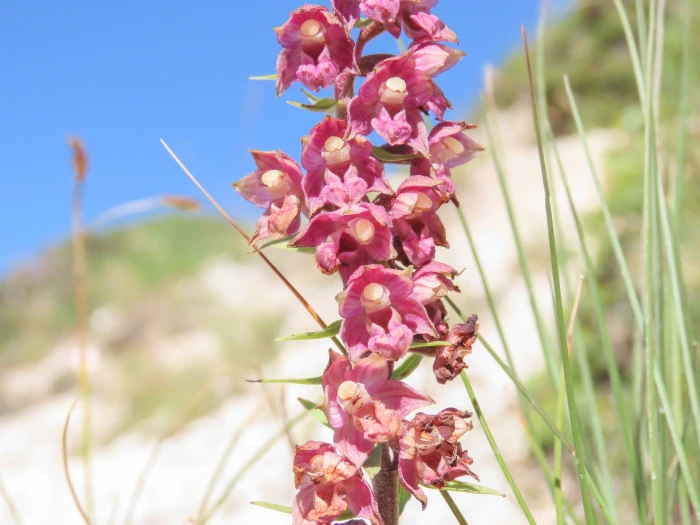Dark-Red Helleborine
(Epipactis atrorubens)
Dark-Red Helleborine (Epipactis atrorubens)
/
/

Emanuele Santarelli
CC BY-SA 4.0
Image By:
Emanuele Santarelli
Recorded By:
Copyright:
CC BY-SA 4.0
Copyright Notice:
Photo by: Emanuele Santarelli | License Type: CC BY-SA 4.0 | License URL: http://creativecommons.org/licenses/by-sa/4.0/ | Rights Holder: Emanuele Santarelli | Publisher: iNaturalist | Date Created: 2021-08-07T09:31:03-07:00 |




















Estimated Native Range
Climate Requirements for Nixa, Missouri
| This Plant | Your Site | Plant Suitability for Your Location | ||
|---|---|---|---|---|
| • Precipitation | 9" - 115" | 44" | Aquatic | Aquatic |
| • High Temp. | 40°F - 93°F | 89°F | Your summer temperatures are normal for this plant. | Excellent |
| • Low Temp. | -16°F - 45°F | 20°F | Your winter temperatures are normal for this plant | Excellent |
This plant may not grow well at your location - your precipitation is too high.
Summary
Epipactis atrorubens, commonly known as Dark-red Helleborine, is a perennial herbaceous orchid native to a variety of habitats including deciduous woodlands, forest clearings, and calcareous grasslands across Europe, extending to Western Siberia and the Caucasus. It is typically found at altitudes ranging from sea level to 7874 feet. This orchid reaches a height of 20-80 cm and features lance-shaped leaves with a distinctive purple-red hue. From June to August, it produces striking purple inflorescences that emit a strong vanilla scent, attracting a range of insect pollinators, especially bees.
Dark-red Helleborine is valued for its unique vanilla fragrance and attractive blooms, making it a point of interest for naturalistic plantings and wildflower gardens. It thrives in dry, rocky, and nutrient-poor soils, reflecting its adaptability to challenging conditions. While it requires minimal maintenance once established, it is crucial to ensure a symbiotic relationship with the right mycorrhizal fungi for successful growth. In cultivation, it prefers partial shade to mimic its native woodland habitat. Due to its specialized ecological relationships, it is not commonly found in the horticultural trade but is of significant interest to orchid enthusiasts and conservationists. The species is protected in some regions due to its ecological importance and vulnerability to habitat loss. It has naturalized in Vermont, USA, where it should be monitored to prevent potential invasiveness.CC BY-SA 4.0
Dark-red Helleborine is valued for its unique vanilla fragrance and attractive blooms, making it a point of interest for naturalistic plantings and wildflower gardens. It thrives in dry, rocky, and nutrient-poor soils, reflecting its adaptability to challenging conditions. While it requires minimal maintenance once established, it is crucial to ensure a symbiotic relationship with the right mycorrhizal fungi for successful growth. In cultivation, it prefers partial shade to mimic its native woodland habitat. Due to its specialized ecological relationships, it is not commonly found in the horticultural trade but is of significant interest to orchid enthusiasts and conservationists. The species is protected in some regions due to its ecological importance and vulnerability to habitat loss. It has naturalized in Vermont, USA, where it should be monitored to prevent potential invasiveness.CC BY-SA 4.0
Plant Description
- Plant Type: Herb
- Height: 1.5-2 feet
- Width: 0.5-1 feet
- Growth Rate: Slow, Moderate
- Flower Color: Purple, Red
- Flowering Season: Summer
- Leaf Retention: Deciduous
Growth Requirements
- Sun: Full Sun
- Water: Medium
- Drainage: Medium
Common Uses
Bee Garden, Butterfly Garden, Low Maintenance, Rock Garden
Natural Habitat
Deciduous woodlands, forest clearings, and calcareous grasslands across Europe to Western Siberia and the Caucasus
Other Names
Common Names: Dark-red Helleborine
Scientific Names: Epipactis atrorubens, Amesia atropurpurea, Amesia rubiginosa, Epipactis atropurpurea, Epipactis atropurpurea f. pallens, Epipactis atropurpurea var. leviconica, Epipactis atropurpurea var. longibracteata, Epipactis atropurpurea var. majoriflora, Epipactis atropurpurea var. orbicularis
GBIF Accepted Name: Epipactis atrorubens